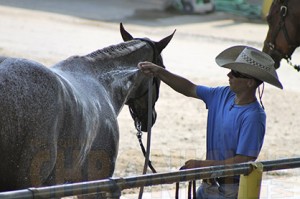10 Hot Weather Tips For Horses
New Bolton Center
Summer heat can be dangerous for horses, resulting in dehydration, lethargy, and general malaise. Severe heat stress may cause diarrhea, or even colic. Owners can take important steps to keep horses safe and comfortable during the hot days ahead.
Janet Johnston, DVM, Emergency and Critical Care veterinarian at Penn Vet’s New Bolton Center, offers the following tips as we approach summer’s official beginning this week:
1. Choose cooler turnout times. If your horse has a stall, but is turned out for part of the day, provide turnout during the cooler hours. Overnight is ideal, but if that’s not possible, then have the horse go outside as early as possible during the day.
2. Provide shade. If your horse lives outdoors, or if it must be outside during the day, provide relief from the sun. A run-in shed is best. Trees are a source of shade, but as the sun moves, so will the shade. Make sure that, regardless of the time of day, available trees are offering shade.
3. Move the air. Fans are a great way to help keep the air moving in the barn, but use them wisely. Your horse will benefit most if the fan is pulling the hot air out of the stall, not pushing air into the stall. And always ensure that your horse cannot reach cords and plugs.
4. Mist your horse. If you are fortunate enough to have a system to mist your horse, use it. As the moisture is absorbed from your horse’s skin, it will take away some of the heat. Frequent mistings are far more effective than a single dousing with a hose.
5. Provide fresh, cool water. Make sure your horse has plenty of fresh, cool water. A bucket hanging on a fence will get warm, and the water will no longer be appealing. Left long enough, the water will also become stagnant and unhealthy. If you are providing clean, cool water and your horse doesn’t seem to be drinking, then encourage it by providing a salt block, or even by misting hay with salt water.
6. Offer electrolytes. If your horse is sweating a great deal, water laced with electrolytes can help keep its body in balance. Whenever you offer electrolytes, however, be sure to offer fresh water, as well. Too many electrolytes can be harmful.
7. Slow down the work. Don’t think that because your horse has been working intensely at 1 pm every day that it can take the heat when the temperature tops 90 degrees. If you have to work your horse in the heat, lighten the work or spread it out over a couple of short sessions. This is especially important when the humidity is high, contributing to the poor quality of the air your horse is breathing.
8. Stick to a schedule. Within the parameters of keeping your horse cool, try to stay as close as possible to a normal schedule. Too much change at one time can be an invitation to colic.
9. Avoid sunburn. Horses, especially white horses, can suffer from sunburn. Even those with white socks and blazes, pink noses, or hairless patches from scarring can be susceptible. Using a fly scrim can help. In addition, applying sunblock to small, particularly vulnerable areas can be effective. Staying out of the sun’s harmful rays will, of course, be best. (Also be aware: if a horse has excessive sunburn, it could indicate a rare, underlying liver disease).
10. Clip horses with longer hair coats. Clipping is important, especially for those with Cushings disease. While some coat can provide protection from the sun and insulation, a long, thick coat tends to hold heat and makes it difficult for the horse to cool down.
About Penn Vet
Penn Vet is a global leader in veterinary medicine education, research, and clinical care. Founded in 1884, Penn Vet is the only veterinary school developed in association with a medical school. The school is a proud member of the One Health Initiative, linking human, animal, and environmental health.
Penn Vet serves a diverse population of animals at its two campuses, which include extensive diagnostic and research laboratories. Ryan Hospital in Philadelphia provides care for dogs, cats, and other domestic/companion animals, seeing nearly 33,000 patients a year. New Bolton Center, Penn Vet’s large-animal hospital on nearly 700 acres in rural Kennett Square, PA, cares for horses and livestock/farm animals, treating 33,000 patients each year – 4,000 in the hospital and 29,000 at farms through the Field Service. In addition, New Bolton Center’s campus includes a swine center, working dairy, and poultry unit that provide valuable research for the agriculture industry.
For more information, visit www.vet.upenn.edu.











